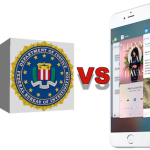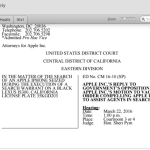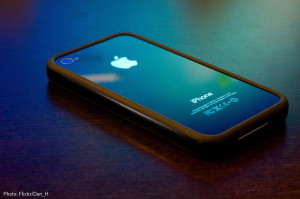The New York Times has broken down our Round 3 debate into nice chunks:

What does the government want? The F.B.I. has been trying to force Apple to help investigators gain access to an iPhone used by Syed Rizwan Farook in the December mass shooting in San Bernardino, Calif. Bureau officials say that encrypted data in Mr. Farook’s phone and its GPS system may hold vital clues about where he and his wife…traveled in the 18 minutes after the shootings, and about whom they might have contacted beforehand. It sounds like a simple problem but the solution would be complex. The password mechanism built into the phone will erase the phone’s data after 10 incorrect password attempts….
And on the other side?

Why is Apple resisting? The company has fought a federal court order requiring it to provide access to the F.B.I., on the grounds that it violates its right to due process. Apple has said that forcing it to write new software violates its First Amendment right…. Courts have ruled in the past that writing code is a form of free speech. Providing help to break into this one iPhone, Apple has also argued, could create a permanent way to bypass iPhone password protection for law enforcement officials or even the spy agencies of other countries….
And the bottom line:

Why does the dispute matter? Simply put, the government contends that cooperation in cases like this could help prevent terrorist attacks against Americans. Privacy advocates and Apple supporters say they worry that if the F.B.I. succeeds in getting access to the software overriding Apple’s encryption, it would create easy access for the government in many future investigations…. But cooperating with the government now could quickly lead to murkier situations internationally, especially in China, where officials have been pushing for greater control over the encryption and security of technology sold there. China has become Apple’s second-largest market after the United States….Saying yes to the United States government could make it hard for Apple to later say no to China, and saying no could significantly affect the company’s bottom line.





